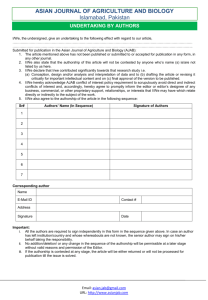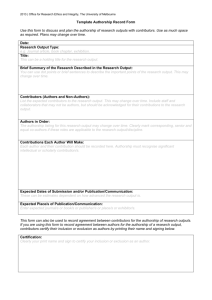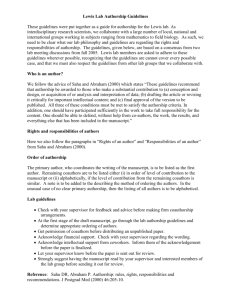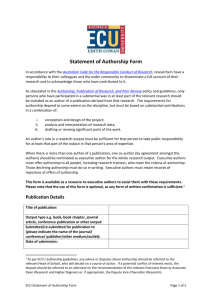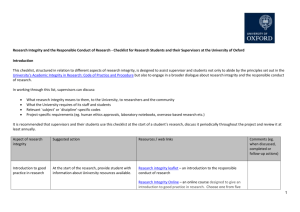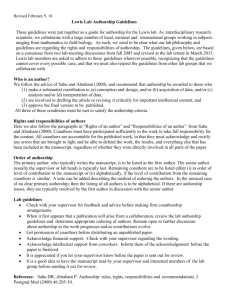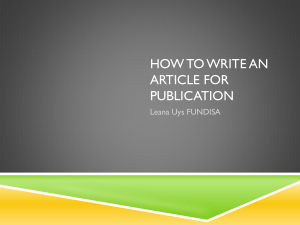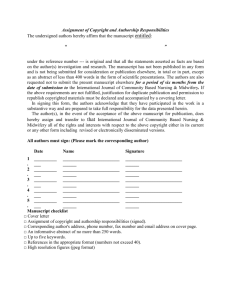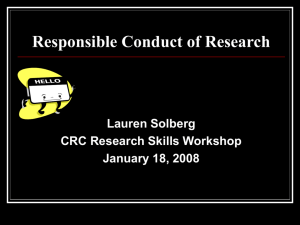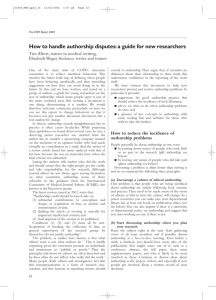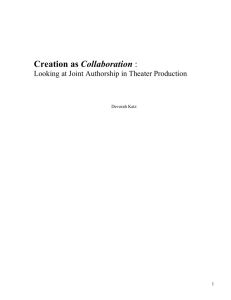Human Genetics Guidelines for Authorship Procedures and Protocols
advertisement
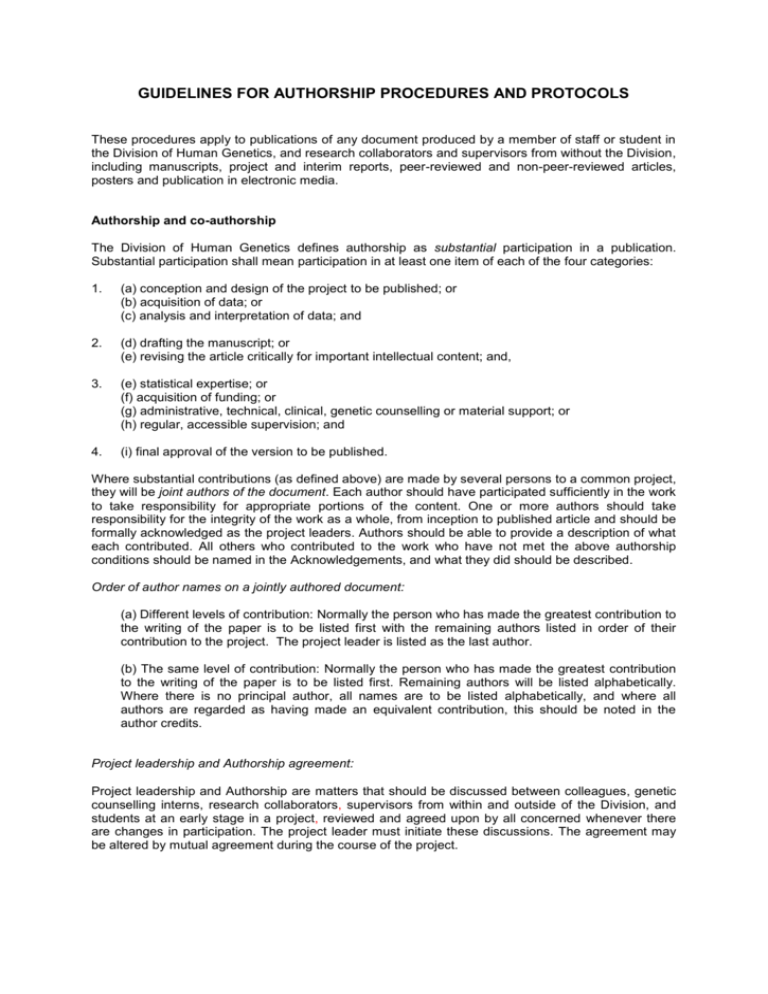
GUIDELINES FOR AUTHORSHIP PROCEDURES AND PROTOCOLS These procedures apply to publications of any document produced by a member of staff or student in the Division of Human Genetics, and research collaborators and supervisors from without the Division, including manuscripts, project and interim reports, peer-reviewed and non-peer-reviewed articles, posters and publication in electronic media. Authorship and co-authorship The Division of Human Genetics defines authorship as substantial participation in a publication. Substantial participation shall mean participation in at least one item of each of the four categories: 1. (a) conception and design of the project to be published; or (b) acquisition of data; or (c) analysis and interpretation of data; and 2. (d) drafting the manuscript; or (e) revising the article critically for important intellectual content; and, 3. (e) statistical expertise; or (f) acquisition of funding; or (g) administrative, technical, clinical, genetic counselling or material support; or (h) regular, accessible supervision; and 4. (i) final approval of the version to be published. Where substantial contributions (as defined above) are made by several persons to a common project, they will be joint authors of the document. Each author should have participated sufficiently in the work to take responsibility for appropriate portions of the content. One or more authors should take responsibility for the integrity of the work as a whole, from inception to published article and should be formally acknowledged as the project leaders. Authors should be able to provide a description of what each contributed. All others who contributed to the work who have not met the above authorship conditions should be named in the Acknowledgements, and what they did should be described. Order of author names on a jointly authored document: (a) Different levels of contribution: Normally the person who has made the greatest contribution to the writing of the paper is to be listed first with the remaining authors listed in order of their contribution to the project. The project leader is listed as the last author. (b) The same level of contribution: Normally the person who has made the greatest contribution to the writing of the paper is to be listed first. Remaining authors will be listed alphabetically. Where there is no principal author, all names are to be listed alphabetically, and where all authors are regarded as having made an equivalent contribution, this should be noted in the author credits. Project leadership and Authorship agreement: Project leadership and Authorship are matters that should be discussed between colleagues, genetic counselling interns, research collaborators, supervisors from within and outside of the Division, and students at an early stage in a project, reviewed and agreed upon by all concerned whenever there are changes in participation. The project leader must initiate these discussions. The agreement may be altered by mutual agreement during the course of the project. 2 Student-genetic counseling intern-staff-supervisor, collaborators and outside supervisors copublication: The conditions listed in (1) to (4) above apply in the first instance. (a) In the case of a co-authored publication by a student and her/his research supervisor that is substantially based on the student’s dissertation or thesis the student will normally be the first author. This condition may be waived after one year if the student plays little or no role in the preparation of the work for publication. In such an instance, the supervisor or person most involved with the project will write the document and become the first author; the student will be the second author provided he/she has participated in (1) to (4). (b) In the case of a research project that has run stale and not been written up for one year after data collection has been completed, a person involved with the project may write the document and become the first author; the remaining contributors being listed provided they have participated in (1) to (4). Exclusions (a) Participation solely in the acquisition of funding or the collection of data does not justify authorship. (b) General supervision or leadership of a research group is not by itself sufficient for authorship. (c) Mere possession of an institutional position, such as Principal Investigator, Programme Coordinator or Head of Division, does not justify authorship credit. Minor contributions to the research or to the writing for publications are appropriately acknowledged. Acknowledgements of contribution to a research project It is normal practice to acknowledge the funders and those who contribute to a publication. The significance of the contribution of those who are acknowledged should be indicated. Disputes Disputes concerning any aspects of authorship described above should in the first instance be resolved between the researchers concerned. Where this is not possible, it should be referred for arbitration to an ad hoc Dispute Committee of three staff members, of any rank, who are not involved with and have no vested interests in the project. If this mechanism fails and the dispute is unable to be resolved, the matter may be referred to the Faculty Research Ethics Committee for final arbitration. IMPORTANT Every staff member, research collaborator, supervisor from outside the Division and student is to sign acknowledgement of receipt of the document. This should occur during the first week of employment, discussions with potential collaborators or supervisors or postgraduate registration respectively. This document is to be revised at the end of each year to ensure that the contents meet the needs of the future expanding scope of the Division. Created and accepted by Human Genetics Division 08.05.2008 Accepted with no revisions 29.01.2009 L. Roberts
